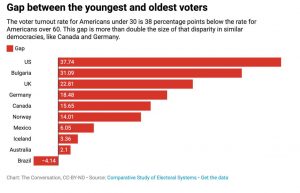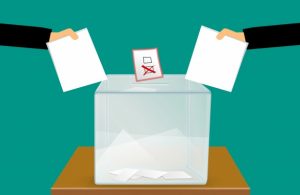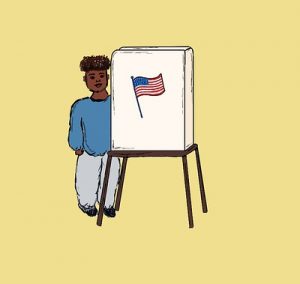Early and mail in voting should be promoted even after the pandemic
Voters are forced to wait in line to vote in person while someone can research elections at home before mailing in their ballot.
December 8, 2020
The pandemic has changed several aspects of life. Some things such as remote learning and mask mandates will go away however others such as remote working in the tech industry will and should persist even after society reopens. One major change that should continue after COVID-19 is the use of early and mail in voting. The percentage of early voters has drastically increased every year starting at 7% of total voters in 1992 but in 2020 that percentage exploded to roughly 60% of all voters with over 100 million ballots cast early out of around 160 million voters.
Early and mail in voting is usually done by opening voting booths early or sending ballots to registered voters or those that requested it which can either be dropped off by hand or sent by mail, with ideally a combination of the three being used as well as encouraged in future elections. Promoting early and mail in voting allows people who normally can’t vote on election day a voice in American politics, makes the process easier for election day voters, and produces a more informed electorate. There are concerns by both the left and right in America relating to election security regarding mail in ballots and while those concerns shouldn’t be ignored, they can often be overstated.
For Republican voters and politicians, their main concern with mail in ballots fear cases of voter fraud whether it be in the form of fake votes from the deceased or ballot harvesting (the mass collection of ballots by a third party that can potentially destroy or tamper with the ballot). However, the actual number of cases of voter fraud are few and the cases of fraud not being caught until after an election are even rarer.
In fact, the only recent large scale case of voter fraud was in North Carolina’s 9th congressional district by Leslie McCrae Dowless on behalf of Republican nominee Mark Davis. Dowless, a GOP operative for Davis, was charged with organizing a network of individuals to illegally collect and tamper with absentee ballots in an election in which Davis beat Democratic nominee Dan McReady by 900 votes. The congressional seat was left vacant and Davis was deemed innocent of working with Dowless.
Republicans also believe that mail in ballots have a partisan advantage to Democrats. Generally speaking, vote by mail is evenly split between both parties. The 2020 election is an anomaly with early voting favored by Democrats by 44.8% vs 30.5% with the rest being by minor parties and independents. However, this divide was most likely fueled by President Donald Trump who has spread claims that early and mail in voting is rife with fraud despite even his Republican allies supporting it even sending multiple lawsuits, which for the most part have been thrown out, to try and remove ballots in swing states that cost him the election.
On the other end of the political spectrum, Democrats worry that mail ballots sent to the United States Postal Service (USPS) rather than delivered to a drop box will fail to be delivered particularly in urban and minority areas. A myth circulated on social media that the USPS lost 300,000 mail in ballots.
When in actuality the 300,000 ballots lacked delivery scans in order to speed up their processing. Democratic voters also fear that mail in ballots postmarked by election day weren’t received until later and so won’t be counted. It’s true that not every state would accept ballots postmarked by Nov. 3rd but not sent afterwards, however 21 states and D.C allowed ballots mailed in but not delivered by the third and the Supreme Court has ruled that they can accept the delayed ballots in North Carolina and Pennsylvania.
Early and mail in voting options help more people vote and make sure the average voter is making more informed decisions. Counties and states such as Napa county or Colorado respectively that switch to all vote by mail options universally regardless of political affiliation see an increase in turnout with said turnout being 5-10% higher compared to the rest of the country.
Early and vote by mail allows Americans to avoid crowded lines as polling locations decline which disproportionately hurt urban and minority communities. Relying on election day voting also hurts working class Americans who are often unable to vote on election day due to their occupation. The study showed that out of those that rarely or never note over 10% listed the main reason as they couldn’t get time off to vote. Early voting options make voting far more accessible to the American public as a whole rather than just that are privileged due to their race and/or class.
One relatively new form of voting is drive through or curbside voting also allows both the elderly and those with disabilities. In Harris County (Houston) alone over 125,000 people used curbside voting with the county seeing record breaking turnout as a whole surpassing its 2016 turnout through early voting alone.
Not only does it allow people to avoid issues at precincts but it gives an option to those who can’t vote on Tuesday due to their occupation. early and mail in voting options also produce a more informed electorate. The study, by Emory University, shows that those that vote by mail have more information on what’s on their ballots and also spend more time researching how to vote. Instead of being bombarded with unfamiliar names in a voting booth a voter who was sent a ballot can research individual candidates and better understand their platforms before mailing in or dropping off the ballot.
Whether it’s deciding the presidential election or the local sanitation district, every vote counts. By increasing early and mail in voting options, it allows Americans to create a government more reflective of their views by allowing more people to participate in elections. There are concerns over mail in voting from both sides of the aisle however these fears are often overblown. Elections can determine whether someone has food on the plate, thousands of dollars of debt or not, or a future for economic mobility and so it’s critical to make it as easy as possible to participate in a democracy.






